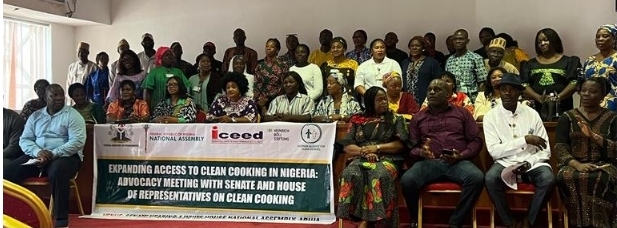Parliamentary staff members from the National Assembly, Abuja have pledged their unwavering support to any legislative framework aimed at promoting clean cooking solutions in Nigeria.
This pledge comes as a significant step towards addressing environmental and public health concerns related to traditional cooking practices in the Nigeria.
The commitment was made during an advocacy meeting with parliamentary staff of the National Assembly in both the Senate and the House of Representatives.
In her opening remarks, the Vice Chairperson (Gas) of the Nigerian Alliance for Clean Cooking and Chief Executive Office, Trifinity Intelligence Consult, Princess Odiaka, underscored the need for a legislative framework to support the draft National Clean Cooking Policy.
She emphasised that without a solid legislative framework, the draft policy may lack the necessary legal backing to be effectively implemented. She stressed the importance of ensuring that the policy aligns with existing laws and regulations to avoid any potential conflicts or loopholes.
During her presentation, Precious Onuvae, Secretary of the Nigerian Alliance for Clean Cooking, underscored the ramifications of inefficient cooking practices on public health and the environment.
Mrs. Onuvae expounded on how ineffective cooking methods, such as traditional stoves and open fires, are culpable for indoor air pollution. She elucidated that this, in turn, results in adverse respiratory conditions, particularly affecting women and children, who are disproportionately exposed to the deleterious effects of such harmful smoke.
According to Mrs. Onuvae, “these harmful cooking practices also contribute to deforestation and climate change. The burning of wood and biomass fuels releases large amounts of carbon dioxide into the atmosphere, exacerbating global warming.”
In her remarks, the Clerk, House Committee on Climate Change, Mrs. Martha A., expressed shock at the devastating effect of inefficient cooking and pledged support for advocacies targeted at mitigating the effect of dirty cooking on both health and the environment.
“We cannot ignore the alarming statistics that show how inefficient cooking contributes to indoor air pollution and respiratory diseases, especially in developing countries. It is crucial for us to prioritise clean cooking solutions and promote sustainable practices that will not only improve people’s health but also reduce greenhouse gas emissions.” She said.
During the plenary session, participants committed to endorsing initiatives and endeavours to expedite the establishment of a comprehensive legislative framework to bolster the draft cooking policy.
Several participants pledged to engage in dialogue with legislators to illuminate the perils associated with inefficient cooking methods on public health and the environment, insights they gleaned from the presentations made at the event.
Several others committed to actively advocating for the allocation of financial resources and logistical support to facilitate the implementation of sustainable cooking practices.
The advocacy meeting with parliamentary staff was aimed at presenting issues facing clean cooking expansion and present the draft national clean cooking policy to the new National Assembly. The meeting also sought to identify legislative champions for clean cooking within the National Assembly.
